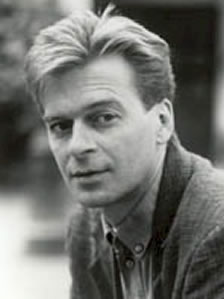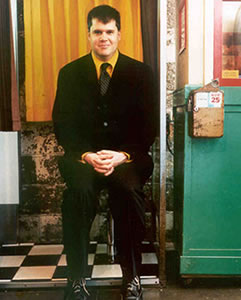De Engelse dichter, essayist en schrijver Stephen Spender werd geboren op 28 februari 1909 in Londen. Zie ook mijn blog van 28 februari 2007.
Daybreak
At dawn she lay with her profile at that angle
Which, when she sleeps, seems the carved face of an angel.
Her hair a harp, the hand of a breeze follows
And plays, against the white cloud of the pillows.
Then, in a flush of rose, she woke, and her eyes that opened
Swam in blue through her rose flesh that dawned.
From her dew of lips, the drop of one word
Fell like the first of fountains: murmured
‘Darling’, upon my ears the song of the first bird.
‘My dream becomes my dream,’ she said, ‘come true.
I waken from you to my dream of you.’
Oh, my own wakened dream then dared assume
The audacity of her sleep. Our dreams
Poured into each other’s arms, like streams.
The Landscape near an Aerodrome
More beautiful and soft than any moth
With burring furred antennae feeling its huge path
Through dusk, the air-liner with shut-off engines
Glides over suburbs and the sleeves set trailing tall
To point the wind. Gently, broadly, she falls,
Scarcely disturbing charted currents of air.
Lulled by descent, the travellers across sea
And across feminine land indulging its easy limbs
In miles of softness, now let their eyes trained by watching
Penetrate through dusk the outskirts of this town
Here where industry shows a fraying edge.
Here they may see what is being done.
Beyond the winking masthead light
And the landing-ground, they observe the outposts
Of work: chimneys like lank black fingers
Or figures frightening and mad: and squat buildings
With their strange air behind trees, like women’s faces
Shattered by grief. Here where few houses
Moan with faint light behind their blinds,
They remark the unhomely sense of complaint, like a dog
Shut out and shivering at the foreign moon.
In the last sweep of love, they pass over fields
Behind the aerodrome, where boys play all day
Hacking dead grass: whose cries, like wild birds
Settle upon the nearest roofs
But soon are hid under the loud city.
Then, as they land, they hear the tolling bell
Reaching across the landscape of hysteria,
To where larger than all the charcoaled batteries
And imaged towers against that dying sky,
Religion stands, the church blocking the sun.

Stephen Spender (28 februari 1909 – 16 juli 1995)
De Duitse schrijver Bodo Morshäuser werd geboren op 28 februari 1953 in Berlijn. Zie ook mijn blog van 28 februari 2007.
Uit: Was denken Jugendliche? Die Ergebnisse der neuen Shell-Studie
„Man kann auch Zweifel daran haben, ob die weite Altersspanne von 12 bis 24 Jahren eine taugliche Größe ist. Schwerwiegender finde ich, daß Jugendliche mit ausländischem Paß, die in Deutschland aufgewachsen sind, ausgeklammert werden. Warum, wird nicht klar benannt. Es handelt sich als
o um eine Untersuchung allein über eine Jugend mit deutschem Paß. Kein Wunder, daß die Realität der Ausländerfeindlichkeit außen vor bleibt.
Nach der Lektüre hatte ich den Eindruck, daß diese Jugendlichen gute Erwachsene werden oder schon sind. Sie haben radikal viel an dieser Gesellschaft auszusetzen. Und suchen ihren Frieden wie auch ihre politische Betätigung im überschaubaren privaten Bereich. Sie sind durch und durch kritisch und kommen, obwohl die Welt gegen sie zu stehen scheint, doch ganz gut klar.
Mit anderen Worten: Nur so fängt ein mündiger Bürger an, mündig oder, negativ gesagt, kritisch frustiert zu sein. Sosehr ich eine Jugendstudie las – es war eine Untersuchung über Menschen in Deutschland. In diesem Fall waren sie eher jünger.“

Bodo Morshäuser (Berlijn, 28 februari 1953)
Foto: Brigitte Friedrich
De Franse filosoof, schrijver en politicus Michel Eyquem de Montaigne werd geboren in Bordeaux op 28 februari 1533. Zie ook mijn blog van 28 februari 2007.
Uit: De l’Amitié
„Je vay bien jusques à ce second point, avec mon peintre : mais je demeure court en l’autre, et meilleure partie : car ma suffisance ne va pas si avant, que d’oser entreprendre un tableau riche, poly et formé selon l’art. Je me suis advisé d’en emprunter un d’Estienne de la Boitie, qui honorera tout le reste de cette besongne. C’est un discours auquel il donna nom : La Servitude volontaire : mais ceux qui l’ont ignoré, l’ont bien proprement dépuis rebatisé, Le Contre Un. Il l’escrivit par maniere d’essay, en sa premiere jeunesse, à l’honneur de la liberté contre les tyrans. Il court pieça és mains des gens d’entendement, non sans bien grande et meritee recommandation : car il est gentil, et plein ce qu’il est possible. Si y a il bien à dire, que ce ne soit le mieux qu’il peust faire : et si en l’aage que je l’ay cogneu plus avancé, il eust pris un tel desseing que le mien, de mettre par escrit ses fantasies, nous verrions plusieurs choses rares, et qui nous approcheroient bien pres de l’honneur de l’antiquité : car notamment en cette partie des dons de nature, je n’en cognois point qui luy soit comparable. Mais il n’est demeuré de luy que ce discours, encore par rencontre, et croy qu’il ne le veit oncques depuis qu’il luy eschappa : et quelques memoires sur cet edict de Janvier fameux par nos guerres civiles, qui trouveront encores ailleurs peut estre leur place. C’est tout ce que j’ay peu recouvrer de ses reliques (moy qu’il laissa d’une si amoureuse recommandation, la mort entre les dents, par son testament, heritier de sa Bibliotheque et de ses papiers) outre le livret de ses oeuvres que j’ay faict mettre en lumiere : Et si suis obligé particulierement à cette piece, d’autant qu’elle a servy de moyen à nostre premiere accointance.”

Michel de Montaigne (28 februari 1533 – 13 september 1592)
De Ierse dichter John Montague werd geboren in New York op 28 februari 1929. Zie ook mijn blog van 28 februari 2007.
There are Days
There are days when
one should be able
to pluck off one’s head
like a dented or worn
helmet, straight from
the nape and collarbone
(those crackling branches!)
and place it firmly down
in the bed of a flowing stream.
Clear, clean, chill currents
coursing and spuming through
the sour and stale compartments
of the brain, dimmed eardrums,
bleared eyesockets, filmed tongue.
And then set it back again
on the base of the shoulders:
well tamped down, of course,
the laved skin and mouth,
the marble of the eyes
rinsed and ready
for love; for prophecy?
No Music
I’ll tell you a sore truth, little understood
It’s harder to leave, than to be left:
To stay, to leave, both sting wrong.
You will always have me to blame,
Can dream we might have sailed on;
From absence’s rib, a warm fiction.
To tear up old love by the roots,
To trample on past affections:
There is no music for so harsh a song.

John Montague (New York, 28 februari 1929)
De Amerikaanse schrijver Daniel Handler werd geboren op 28 februari 1970 in San Francisco, Californië. Zie ook mijn blog van 28 februari 2007.
Uit: Watch Your Mouth
“There’s never been an opera about me, never in my entire life. Normally this wouldn’t bother me. There hasn’t been one about you, either, and besides, I’m still young. If my life were a play, this would be the last few minutes before the lights lowered and everything began. The audience would be milling around — the older couples in formal, non-funky suits with pearls hanging around the women’s necks like drops of semen, and the younger people in black shirts and jeans because the formality of theater is an elitist tyrannical paradigm and lots of people in the clothes they wore to work because, frankly, by the time they got home and jumped into the shower and changed their clothes they’d either be late, which they hate, or they’d be on time but so stressed out that they couldn’t really enjoy it, and frankly, if you’re going to pay that much for tickets what’s the use if you’re not going to enjoy it, so what they do is just wear some slightly dressier work clothes to work and then go right to the theater, locking the briefcase in the trunk and sometimes even having time for a cocktail or something, but not for dinner because they hate wolfing down dinner and rushing to the theater, it’s so stressful, they might as well go home and shower and change if they want to be stressed out before the show even starts.
This is some snatch of lobby-talk that Stan, the manager of the Pittsburgh Opera, overheard and never forgot. And never forgot to repeat. ?That’s our audience, Joseph,? he said to me. ?Just regular working folk. We have to create opera for them that’s not just interesting but fascinating, mesmerizing. So that they transcend all the stress about whether to change or where to have dinner or parking or whatever, and really hear the music. That’s what opera’s for. Do you have any more of those candies??”

Daniel Handler (San Francisco, 28 februari 1970)
Zie voor onderstaande schrijver ook mijn blog van 28 februari 2007.
De Franse schrijver, dramaturg en regisseur Marcel Pagnol werd geboren op 28 februari 1895 in Aubagne, Bouches-du-Rhône.





